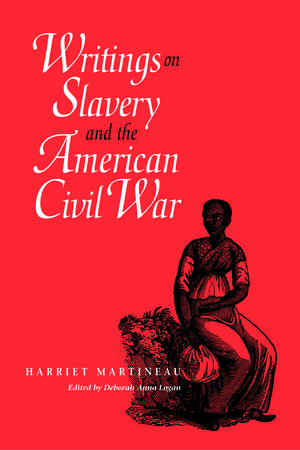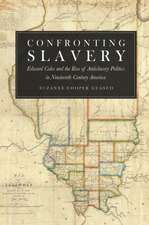Writings on Slavery and the American Civil War
Autor Harriet Martineauen Limba Engleză Hardback – 30 apr 2002
A leading social reformer and pioneering abolitionist, British journalist Harriet Martineau fueled the debate over the abolition of slavery that raged on both sides of the Atlantic before the American Civil War. Her impassioned writings about abolition—with more than fifty essays and articles collected in this premier annotated edition—provide piercing insights into American society, politics, and the issue of slavery.
Determined to give a fair, objective hearing to both sides of the American slavery debate, Martineau crossed the ocean in 1834 and discovered a nation in turmoil. As a prominent writer, she was vigorously courted by both opponents and supporters of slavery who sought her endorsement for their political cause. From northern mansions to southern plantations, from Congress and President Jackson's White House to hospitals, factories, and slave quarters, people opened their doors to Martineau, providing her an unusually comprehensive view of American life.
Shocked by the intensity of the controversy over slavery, and inspired by the bravery and defiance of abolitionists who campaigned in the face of social pressure and physical danger, Martineau publicly declared her support of abolition in 1835. Joining the ranks of the abolitionists made Martineau a prime target for persecution, and the remainder of her stay in America was fraught with death threats. She returned to England and promoted her cause by writing for the British periodical press, a career that would span the next thirty-five years. Martineau's friend and fellow abolitionist William Lloyd Garrison praised her as a "social heretic" whose compulsion to uphold the moral ground of human dignity and freedom outweighed any concern with popular opinions about her character or reputation. Twenty years after her dramatic American tour, Martineau wrote with pride that her name was "still reviled" in the South.
One of the first women to earn a living by her pen, Martineau never faltered in the lifelong crusade that placed her in the forefront of political and social reform efforts. Writings on Slavery and the American Civil War conveys one woman's persistent call for absolute, immediate, and universal emancipation.
Determined to give a fair, objective hearing to both sides of the American slavery debate, Martineau crossed the ocean in 1834 and discovered a nation in turmoil. As a prominent writer, she was vigorously courted by both opponents and supporters of slavery who sought her endorsement for their political cause. From northern mansions to southern plantations, from Congress and President Jackson's White House to hospitals, factories, and slave quarters, people opened their doors to Martineau, providing her an unusually comprehensive view of American life.
Shocked by the intensity of the controversy over slavery, and inspired by the bravery and defiance of abolitionists who campaigned in the face of social pressure and physical danger, Martineau publicly declared her support of abolition in 1835. Joining the ranks of the abolitionists made Martineau a prime target for persecution, and the remainder of her stay in America was fraught with death threats. She returned to England and promoted her cause by writing for the British periodical press, a career that would span the next thirty-five years. Martineau's friend and fellow abolitionist William Lloyd Garrison praised her as a "social heretic" whose compulsion to uphold the moral ground of human dignity and freedom outweighed any concern with popular opinions about her character or reputation. Twenty years after her dramatic American tour, Martineau wrote with pride that her name was "still reviled" in the South.
One of the first women to earn a living by her pen, Martineau never faltered in the lifelong crusade that placed her in the forefront of political and social reform efforts. Writings on Slavery and the American Civil War conveys one woman's persistent call for absolute, immediate, and universal emancipation.
Preț: 464.42 lei
Nou
Puncte Express: 697
Preț estimativ în valută:
88.87€ • 96.83$ • 74.88£
88.87€ • 96.83$ • 74.88£
Carte tipărită la comandă
Livrare economică 23 aprilie-07 mai
Preluare comenzi: 021 569.72.76
Specificații
ISBN-13: 9780875802923
ISBN-10: 0875802923
Pagini: 383
Dimensiuni: 152 x 229 x 41 mm
Greutate: 0.74 kg
Ediția:1
Editura: Northern Illinois University Press
Colecția Northern Illinois University Press
ISBN-10: 0875802923
Pagini: 383
Dimensiuni: 152 x 229 x 41 mm
Greutate: 0.74 kg
Ediția:1
Editura: Northern Illinois University Press
Colecția Northern Illinois University Press
Recenzii
"Beautifully written ... a valuable addition to nineteenth-century studies."—Indiana Magazine of History
"The collection provides us with a richer understanding of abolitionism."—Civil War History
"Accessible and extensively researched ... highly recommended."—Choice
"The collection provides us with a richer understanding of abolitionism."—Civil War History
"Accessible and extensively researched ... highly recommended."—Choice
Notă biografică
Deborah Anna Logan is Assistant Professor of English at Western Kentucky University in Bowling Green. She is also author of The Hour and the Woman: Harriet Martineau's "Somewhat Remarkable" Life.
Cuprins
Table of Contents
Introduction: The Theory and Practice of Society in America: Deborah Anna Logan
Part One: The American Travel Writings
Society in America, 1837
Retrospect of Western Travel, 1838
Three Letters on America
The Martyr Age of the United States, 1839
Part Two: Newspapers and Periodicals
The Liberty Bell, 1839–1858
London's Daily News, 1852–1866
The Spectator, 1858
The National Anti-Slavery Standard,1859–1862
Once a Week, 1861–1862
Part Three: Journal Articles
Interpreting the Sectional Divide, 1854–1857
On the Eve of War, 1858–1860
War and Reconstruction, 1862–1864
Appendix: Itinerary of Harriet Martineau's American Tour
Notes
Works Cited
Index
Part One: The American Travel Writings
Society in America, 1837
Retrospect of Western Travel, 1838
Three Letters on America
The Martyr Age of the United States, 1839
Part Two: Newspapers and Periodicals
The Liberty Bell, 1839–1858
London's Daily News, 1852–1866
The Spectator, 1858
The National Anti-Slavery Standard,1859–1862
Once a Week, 1861–1862
Part Three: Journal Articles
Interpreting the Sectional Divide, 1854–1857
On the Eve of War, 1858–1860
War and Reconstruction, 1862–1864
Appendix: Itinerary of Harriet Martineau's American Tour
Notes
Works Cited
Index
Descriere
A leading social reformer and pioneering abolitionist, British journalist Harriet Martineau fueled the debate over the abolition of slavery that raged on both sides of the Atlantic before the American Civil War. Her impassioned writings about abolition—with more than fifty essays and articles collected in this premier annotated edition—provide piercing insights into American society, politics, and the issue of slavery.
Determined to give a fair, objective hearing to both sides of the American slavery debate, Martineau crossed the ocean in 1834 and discovered a nation in turmoil. As a prominent writer, she was vigorously courted by both opponents and supporters of slavery who sought her endorsement for their political cause. From northern mansions to southern plantations, from Congress and President Jackson's White House to hospitals, factories, and slave quarters, people opened their doors to Martineau, providing her an unusually comprehensive view of American life.
Shocked by the intensity of the controversy over slavery, and inspired by the bravery and defiance of abolitionists who campaigned in the face of social pressure and physical danger, Martineau publicly declared her support of abolition in 1835. Joining the ranks of the abolitionists made Martineau a prime target for persecution, and the remainder of her stay in America was fraught with death threats. She returned to England and promoted her cause by writing for the British periodical press, a career that would span the next thirty-five years. Martineau's friend and fellow abolitionist William Lloyd Garrison praised her as a "social heretic" whose compulsion to uphold the moral ground of human dignity and freedom outweighed any concern with popular opinions about her character or reputation. Twenty years after her dramatic American tour, Martineau wrote with pride that her name was "still reviled" in the South.
One of the first women to earn a living by her pen, Martineau never faltered in the lifelong crusade that placed her in the forefront of political and social reform efforts. Writings on Slavery and the American Civil War conveys one woman's persistent call for absolute, immediate, and universal emancipation.
Determined to give a fair, objective hearing to both sides of the American slavery debate, Martineau crossed the ocean in 1834 and discovered a nation in turmoil. As a prominent writer, she was vigorously courted by both opponents and supporters of slavery who sought her endorsement for their political cause. From northern mansions to southern plantations, from Congress and President Jackson's White House to hospitals, factories, and slave quarters, people opened their doors to Martineau, providing her an unusually comprehensive view of American life.
Shocked by the intensity of the controversy over slavery, and inspired by the bravery and defiance of abolitionists who campaigned in the face of social pressure and physical danger, Martineau publicly declared her support of abolition in 1835. Joining the ranks of the abolitionists made Martineau a prime target for persecution, and the remainder of her stay in America was fraught with death threats. She returned to England and promoted her cause by writing for the British periodical press, a career that would span the next thirty-five years. Martineau's friend and fellow abolitionist William Lloyd Garrison praised her as a "social heretic" whose compulsion to uphold the moral ground of human dignity and freedom outweighed any concern with popular opinions about her character or reputation. Twenty years after her dramatic American tour, Martineau wrote with pride that her name was "still reviled" in the South.
One of the first women to earn a living by her pen, Martineau never faltered in the lifelong crusade that placed her in the forefront of political and social reform efforts. Writings on Slavery and the American Civil War conveys one woman's persistent call for absolute, immediate, and universal emancipation.











